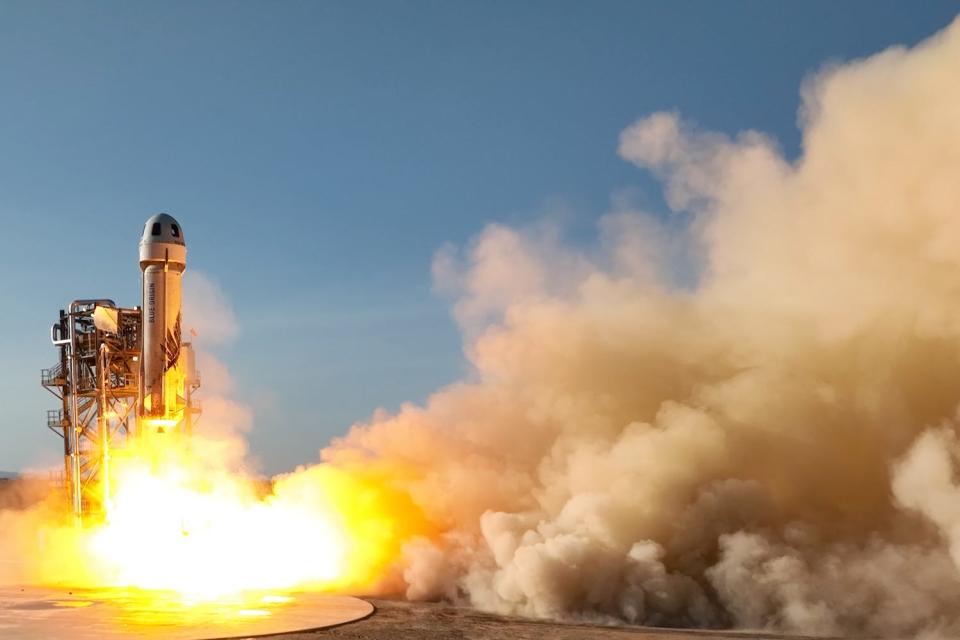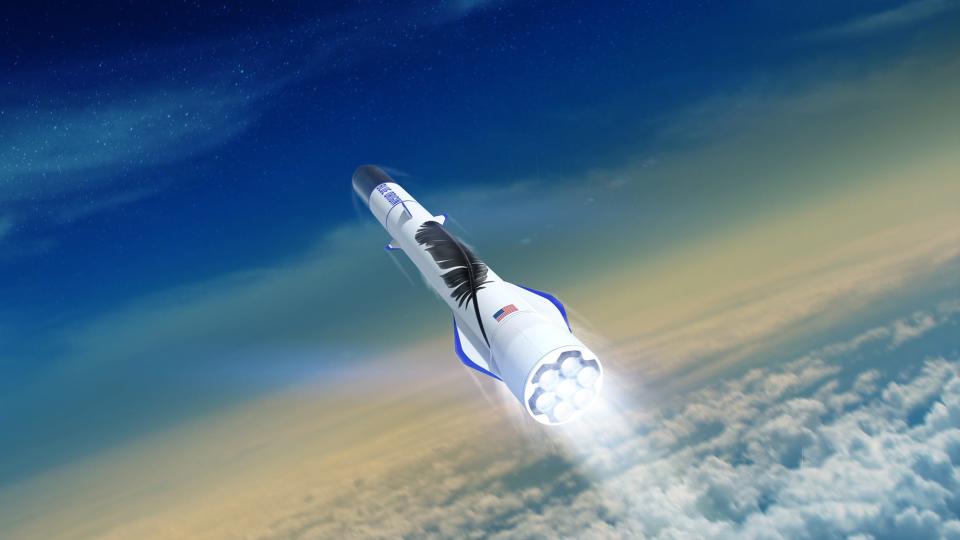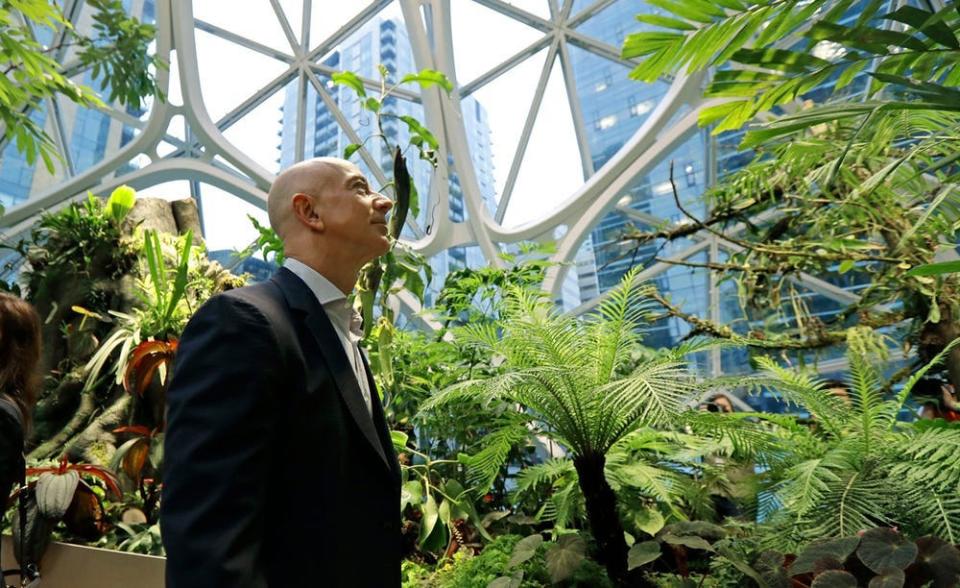-
Jeff Bezos’ Blue Origin plans to launch a crewed rocket for the first time in nearly two years.
-
The New Shepard rocket was grounded for months after a failed uncrewed launch in September 2022.
-
The delay has allowed space tourism rivals like Virgin Galactic to catch up.
Jeff Bezos’ private space company Blue Origin recently announced plans to launch a six-person crew aboard its New Shepard rocket this Sunday.
If all goes well, this will be the company’s first manned rocket launch in about two years. The last crewed flight took place in August 2022 and included Sara Sabry, the first Egyptian and Arab woman in space.
The launch planned for this weekend will be a major milestone for the company; It marks the return of crewed suborbital spaceflight and the millions of dollars in revenue that comes with it.
Late last year, though, Jeff Bezos told Lex Fridman on Fridman’s podcast that “Blue Origin needs to be a lot faster.”
This is why Blue Origin is lagging behind rivals like Virgin Galactic and SpaceX.
Why did Blue Origin’s upcoming launch take 2 years?

Blue Origin has been bullish in 2021 and the first half of 2022, completing about one New Shepard launch every two months; this was the highest number in the company’s history.
But then one of its uncrewed rockets failed on September 12, 2022.
About a minute into the flight, Blue Origin lost the first stage booster due to a faulty nozzle in the booster’s engine. The first stage fell from the skies and crash-landed in the Texas desert. No people, buildings or other property were harmed.
But what was damaged was the space company’s momentum.
The Federal Aviation Administration subsequently grounded New Shepard until Blue Origin took 21 corrective actions, including redesigning some engine and nozzle components, to prevent a similar mishap.
The space company has devoted more than 400 days to another launch. That gave Virgin Galactic, one of Blue Origin’s rivals, time to catch up after disruptions in the early 2020s.
Blue Origin’s suborbital business


Virgin Galactic and Blue Origin are in the suborbital space tourism business. They fly people into suborbital space at an altitude of about 60 miles, where they can experience weightlessness for several minutes before returning.
Virgin Galactic has completed half a dozen crewed launches with SpaceShipTwo vehicles in 2023. These launches included the company’s first commercial service flight with members of the Italian Air Force in June 2023 and its first flight carrying private astronauts in August of the same year.
But the company ran aground in February after a small piece of the spaceplane’s mothership fell off during Virgin Galactic’s last space tourism flight. So this Sunday’s launch could be a chance for Blue Origin to catch up.
However, the cost of tickets for Blue Origin’s rocket and Virgin Galactic’s space plane is significant in terms of the companies’ competitiveness.
Prices vary widely, and Blue Origin doesn’t disclose how much it charges per seat on New Shepard. But Quartz reports that a seat at Blue Origins’ last crewed launch in August 2022 costs about $1.25 million. That’s nearly three times the cost of the $450,000 seat on Virgin Galactic.
Blue Origin’s orbit dreams and delays


While suborbital tourism is lucrative, the real money lies in orbital spaceflight.
Private companies have been doing this for years, including SpaceX (founded 2002), United Launch Alliance (founded 2006), and Rocket Lab (founded 2006).
Reaching orbit requires larger, more powerful rockets, which are more costly and time-consuming to build. But the real benefit is that there’s a much larger market for companies looking to send satellites or other technology into orbit than just flying around in a spaceship for a few minutes.
During their lifetimes, SpaceX has launched more than 300 rockets into orbit, while ULA has launched 155 and Rocket Lab has launched more than 45 rockets. By comparison, Blue Origin has yet to launch a rocket into orbit – although a New Glenn orbital rocket is planned. It will be first launched later this year.
Bezos’ company announced it would build New Glenn in 2016, with the inaugural launch planned for 2020. However, the company suffered a series of disruptions and the take-off was delayed.
These delays cost Blue Origin potentially millions of dollars in service flights that companies are willing to pay to get their technology into orbit. ULA, for example, states on its website that its rockets have “deployed more than $70 billion worth of satellite assets into orbit.”
However, Blue Origin has contracts with NASA, the US Space Force and Amazon for the New Glenn rocket once it is ready to fly.
Bezos says Blue Origin’s culture isn’t fast enough


Part of Blue Origin’s slow pace is the work culture Bezos aims to change.
“We’re going to be really good at taking the appropriate technology risk and making those decisions quickly, being bold on those issues and having the right culture that supports that,” Bezos told Fridman.
The planned launch on Sunday is a step in the right direction for Blue Origin. He may be trying to catch up now, but Bezos wants to kick the company into high gear by telling Fridman that’s one of the reasons he’s stepping down as Amazon’s CEO.
“I handed over the CEO role, and the main reason I did that was to be able to take the time and bring some energy and a sense of urgency to Blue Origin. We need to move much faster, and we are,” he said. aforementioned.
Blue Origin did not respond to Business Insider’s request for comment.
Read the original article on Business Insider